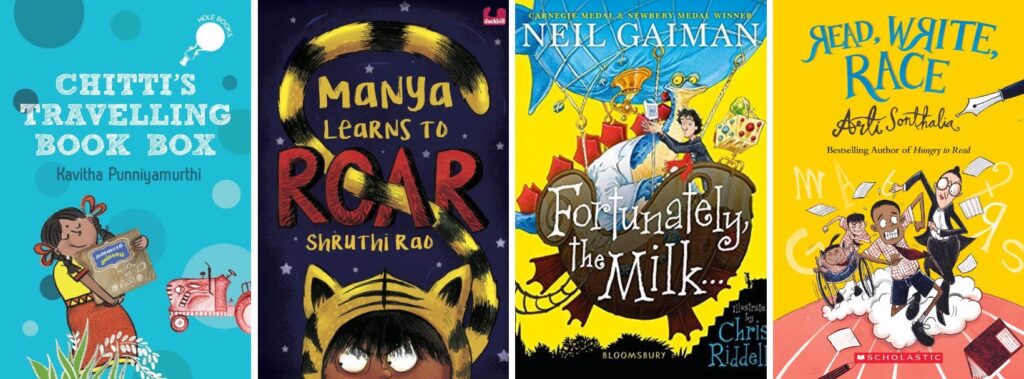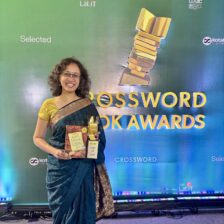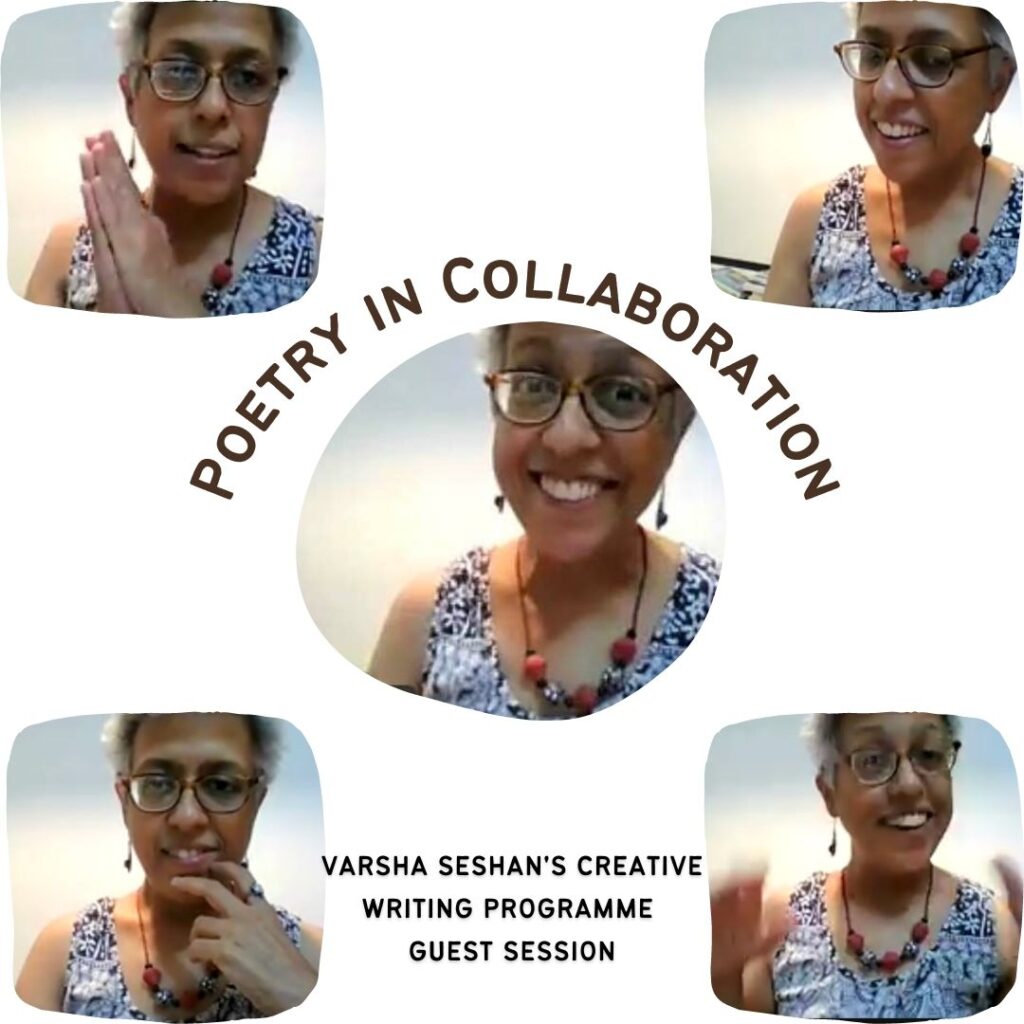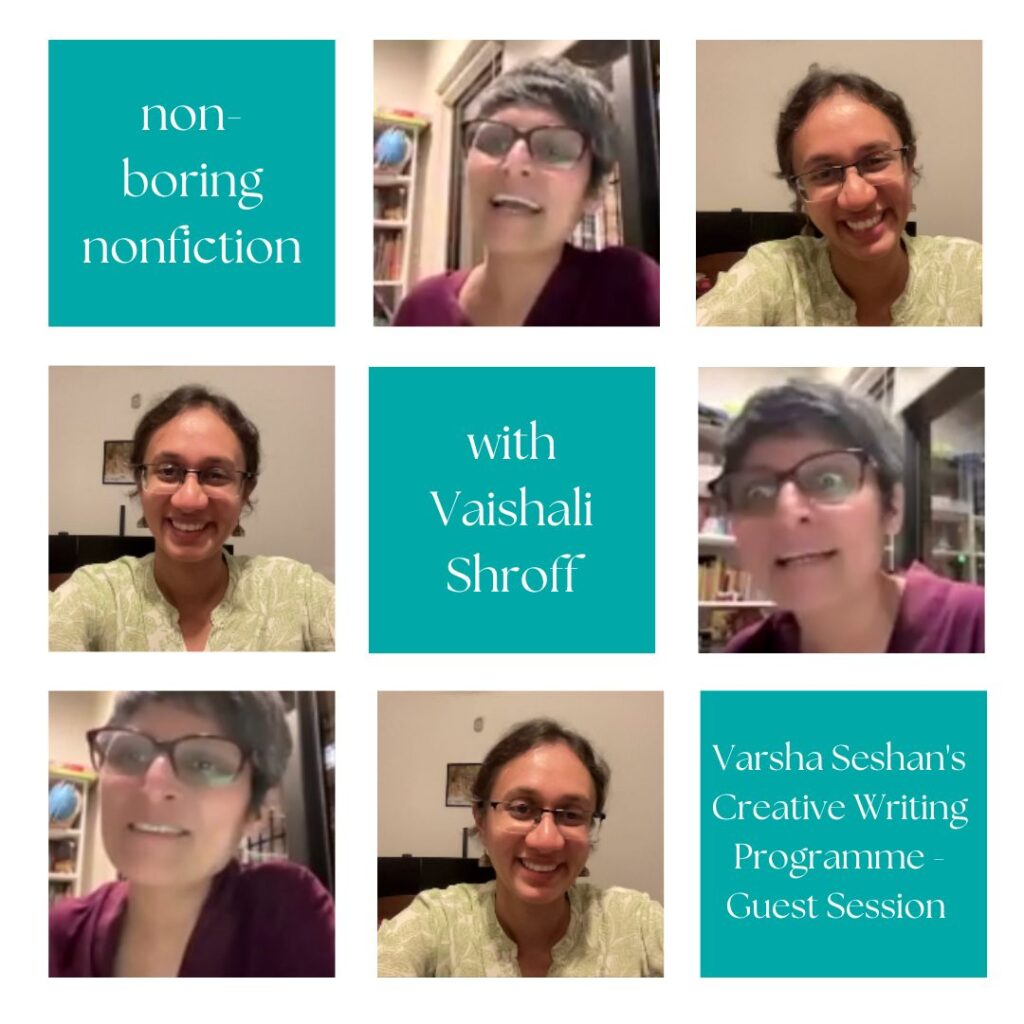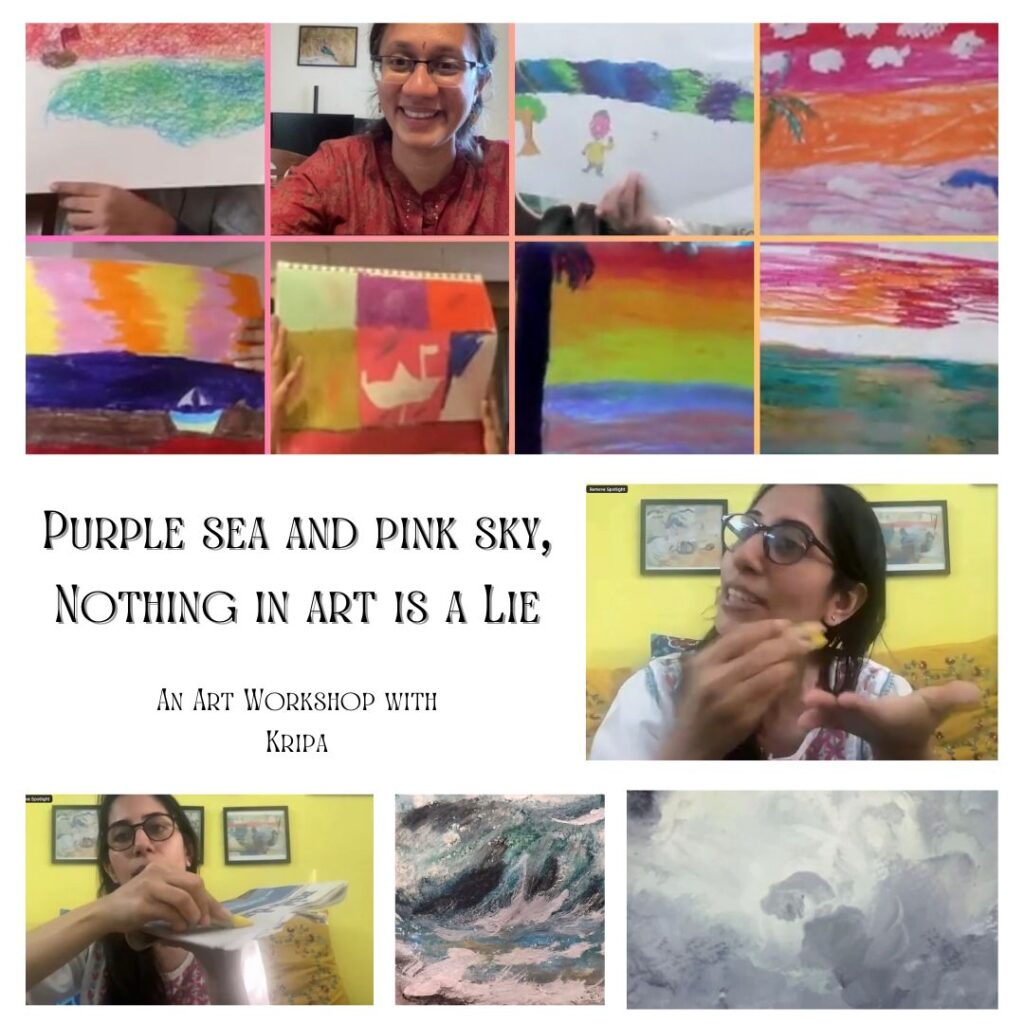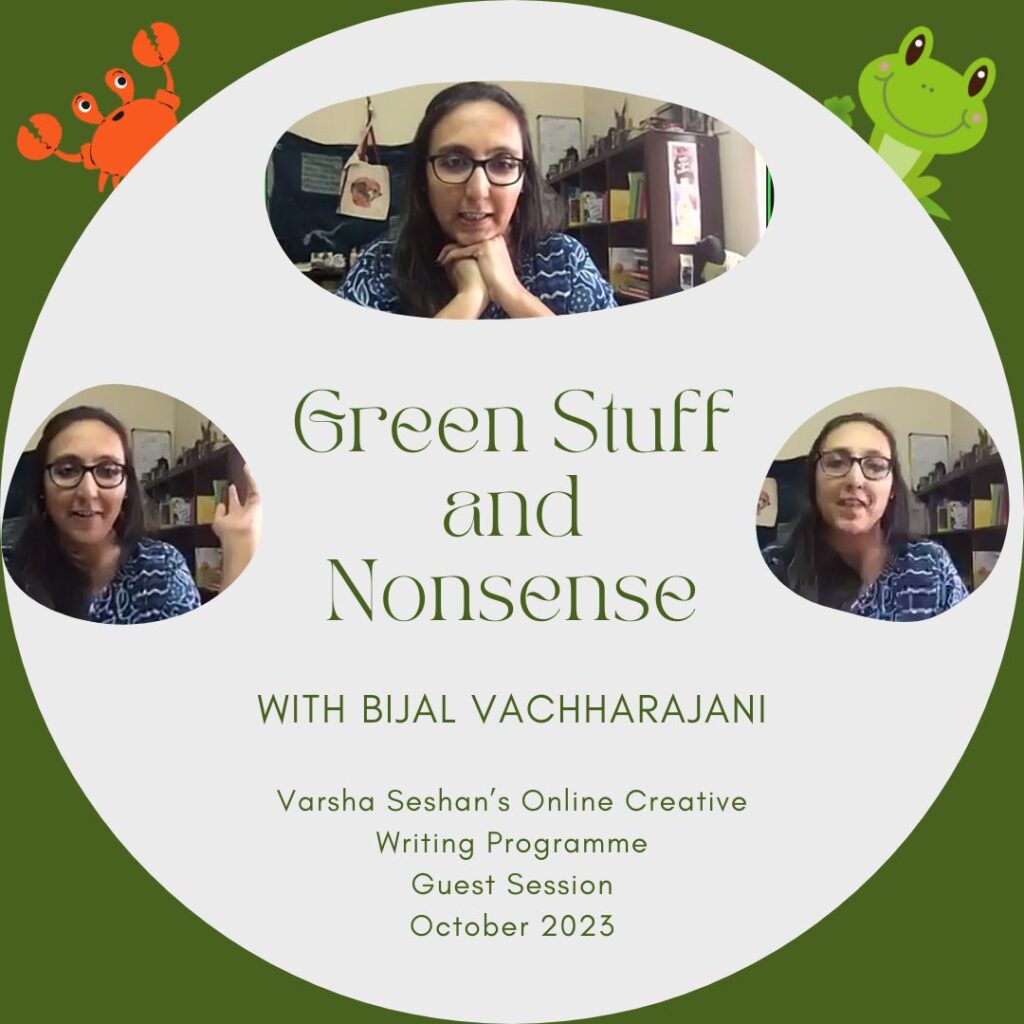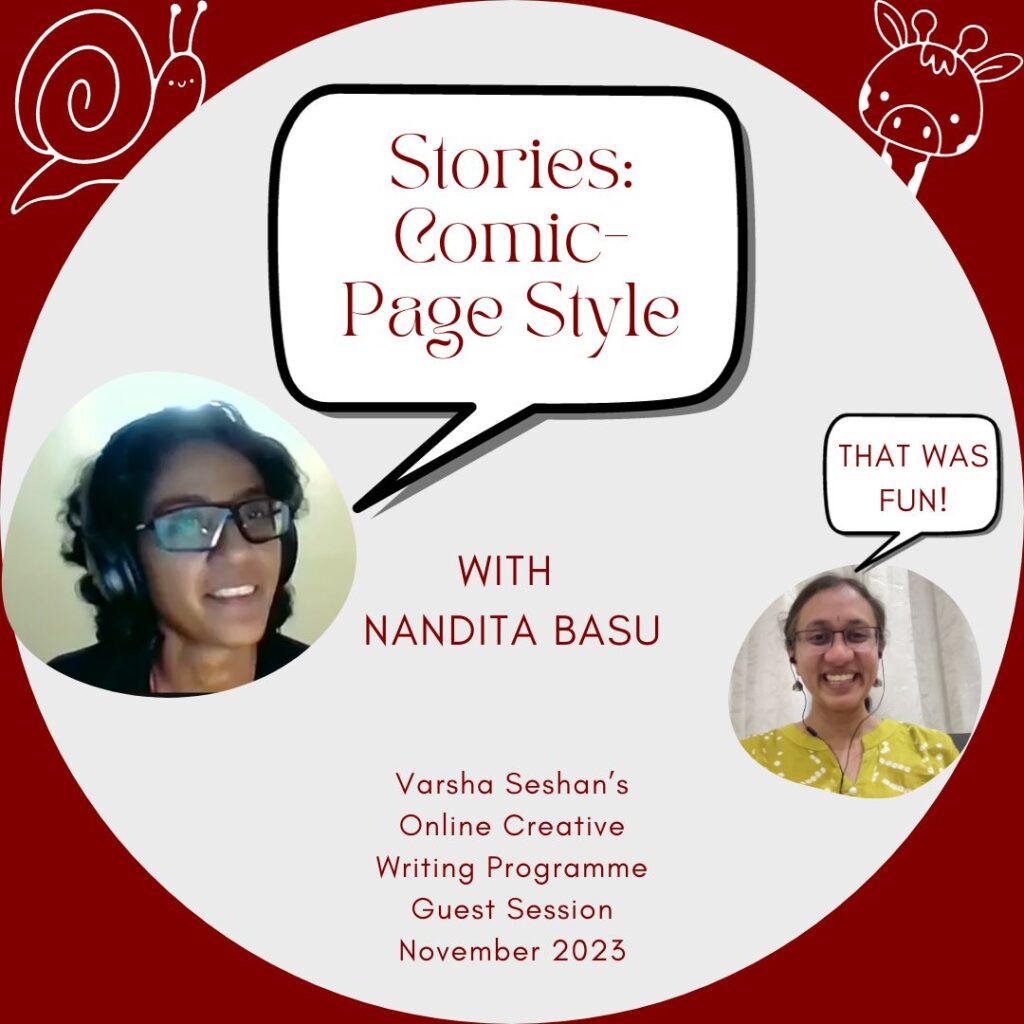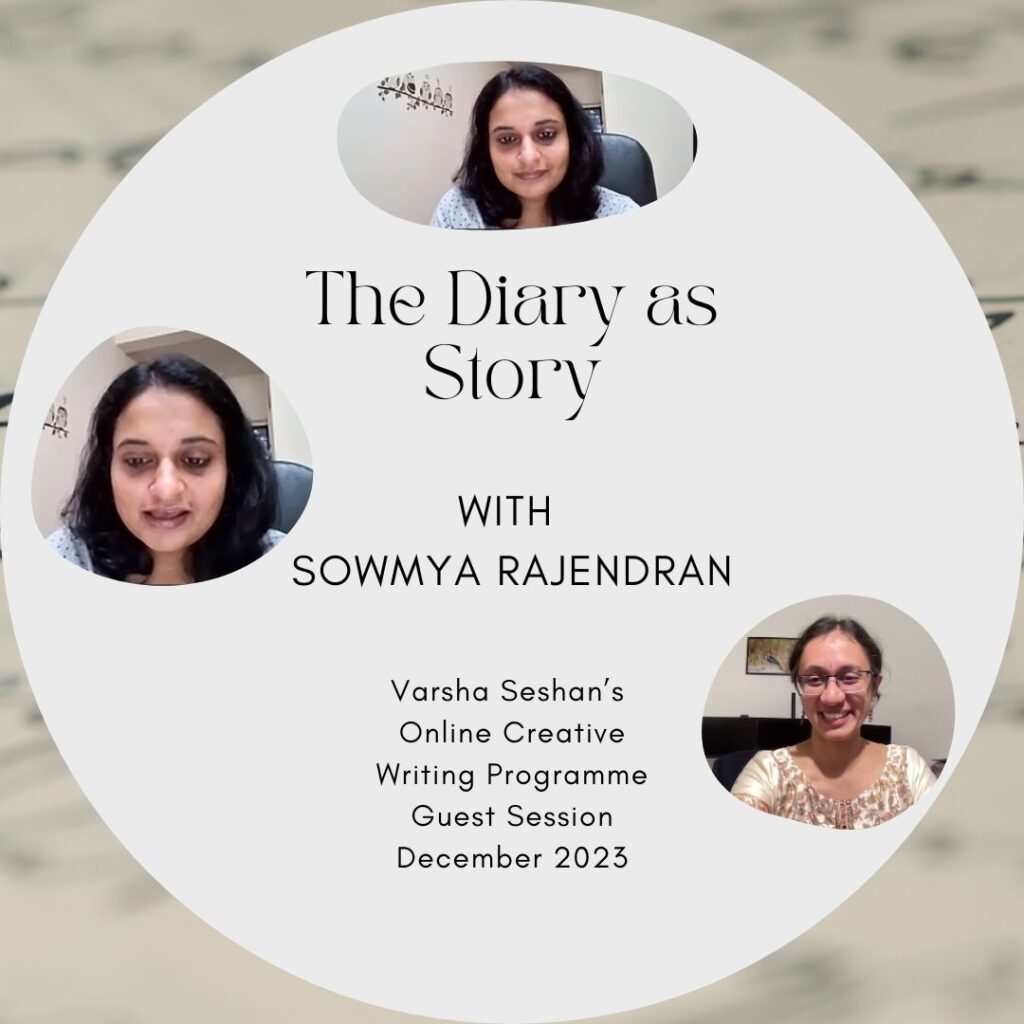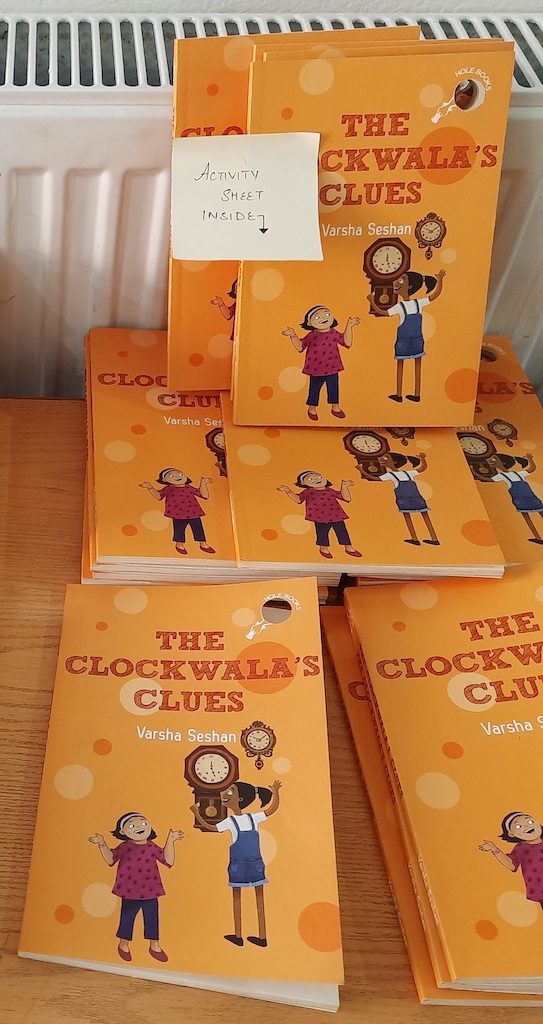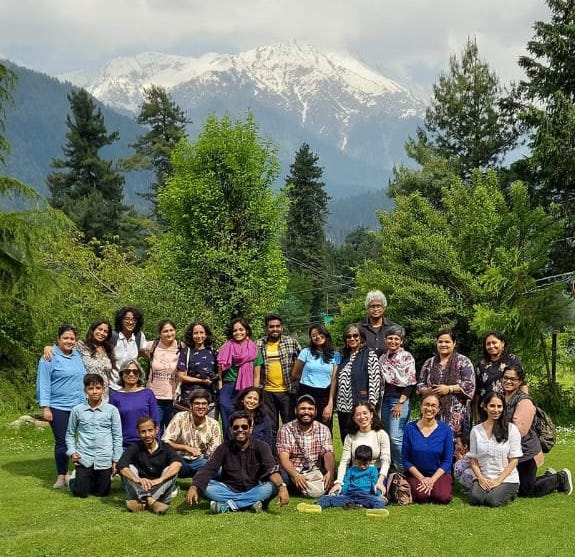Ostrich Girl
May 1, 2024
I love introducing children to brand-new books, hot off the press! I read Ostrich Girl written by Lesley D Biswas and illustrated by Anupama Ajinkya Apte, and I loved the possibilities of exploring this book with my book club! Here’s what we’ll do as we read.
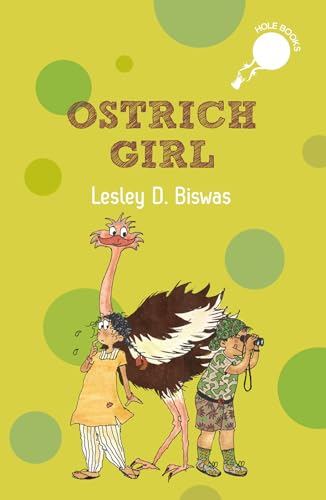
Sounds
The Secret Songsters imitate bird calls to fool tourists into believing that there are lots of birds on Henry Island. That’s the perfect opportunity for us to explore bird calls! I will ask the children to imitate any birds they know, and then I’ll play a few bird calls for them to identify.
Bird Trivia
Children love trivia! I look forward to asking the children to talk to me about birds they know, after which we will talk about a few unusual birds—including the ostrich, the roadrunner, the penguin, the drongo, and more! We’ll also look at pictures of all the birds Ostrich Girl mentions.
Word Games
Spotting birds is fun! Even though we might not be able to do that together, unless I’m lucky enough to have a feathered visitor in my balcony during class, we’ll do a word search puzzle based on birds, both the ones we find in the book and others that we find easily around us.
Join my book club!
Registrations are closed for this edition of my book club. New batches begin every alternate month. Join my mailing list if you would like to receive email notifications about my programmes. Alternatively, follow me on social media – Facebook and Instagram – for regular updates.
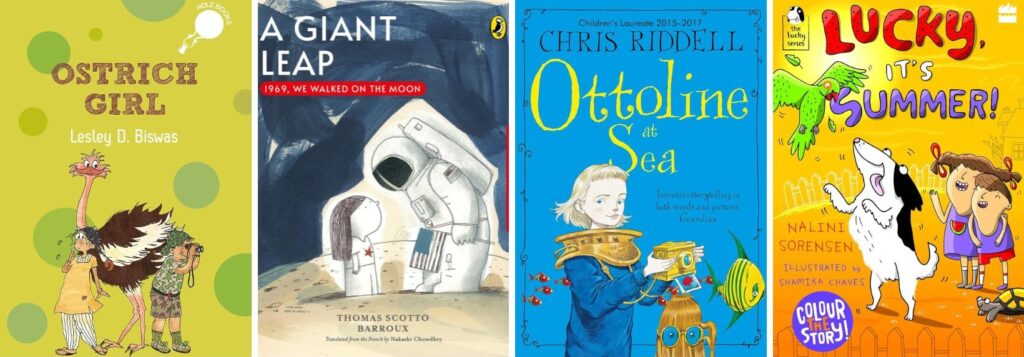
How to Rhyme Without Reason
April 21, 2024

How I love guest sessions! Yesterday’s workshop on nonsense verse with Anushka Ravishankar was a treat. It’s delightful how serious nonsense verse is! Full of contradictions, full of rules (of what nonsense verse is not), and full of surprises, we learned so much and wrote nonsense poems of our own too.
Essentially, nonsense writing is a serious kind of writing which makes no sense. Does this seem contradictory? That’s where the humour of nonsense lies. While gibberish is not nonsense, we learned how we could use made-up words as part of a larger text, like in the poem ‘Jabberwocky’ by Lewis Carroll. I agree with Anushka when she says that it’s a shame that so many of Carroll’s words are now in the dictionary. They were never supposed to make sense!
We had a FULL batch yesterday, and the participants had dozens of questions, ideas, and poems to share. From Sukumar Ray to Shel Silverstein, we explored a range of writers, listening to all kinds of nonsense poetry.
For me, the best part was the very clear and organised set of techniques Anushka shared with us. How do we actually go about writing nonsense verse? When is it nonsense verse and when is it gibberish or fantasy? How can we straddle sense and nonsense so that our poems almost make sense?
Anushka ended the session with an exercise on nonsense verse, which was especially lovely, for it revealed how well the participants caught on to the sense of nonsense!
Why I Think Online Workshops Are More Effective than Offline Ones
April 12, 2024
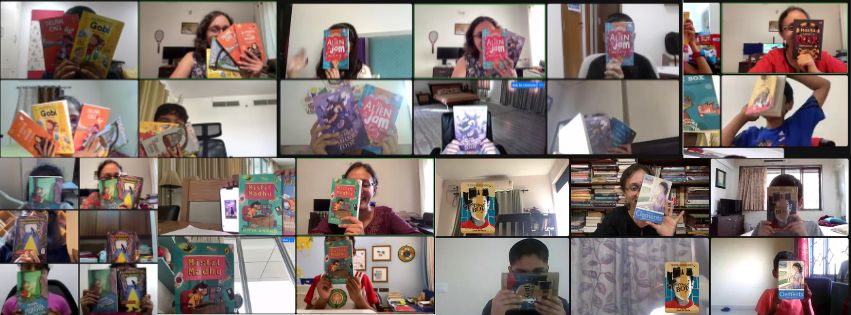
A Little History
I started conducting reading and writing workshops for children in 2013 at the British Library, Pune. It was fun, and the library space was exciting. Both as standalone events and as part of the library’s larger Reading Challenges, it seemed to me that libraries were ideal for workshops of the kind I liked to conduct.
Soon, I contacted other libraries and conducted sessions elsewhere too – at Just Books, Atta Galatta, The Story Station … Sometimes, the response was excellent, overwhelming. At other times, no one showed up.
As someone starting out, this was, naturally, demotivating! But I kept at it … for reasons I won’t get into right now.
The Current Scenario
Since 2020, I’ve been teaching primarily online. And in some ways, teaching online is the same. For instance, right now, four of my six batches are sold out! All my batches have enough participants for me to go ahead and conduct my sessions, and that’s always exciting.
But that doesn’t mean I haven’t cancelled sessions in the past. I haven’t (yet) had to cancel a writing programme, but there have been book clubs that have had a rather underwhelming response, especially as post-pandemic, parents are keen on reducing their children’s screen time.
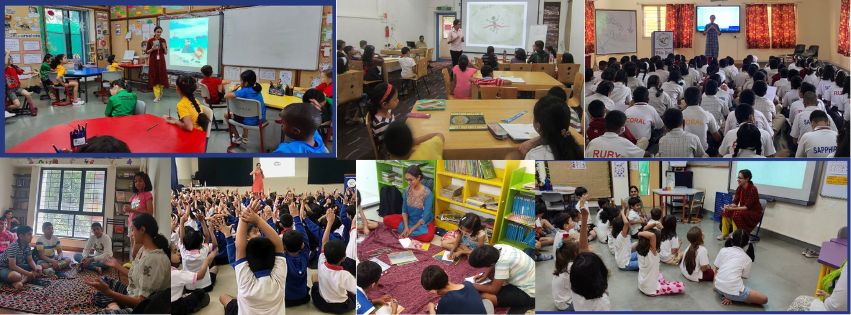
Offline to Hybrid
But here is where things get interesting.
I started running a writers’ club at a school in Pune in 2015. Pre-pandemic, online sessions were out of the question. We had fun; we even brought out a book called Flickering Flames, celebrating the school’s sesquicentennial year.
In 2020, we discontinued the writers’ club, thanks to covid. I got busy with my own workshops and programmes, and I finally agreed to start teaching again in 2023, on the condition that I could conduct some of my sessions online when I was travelling.
At the end of the academic year, I asked the children to submit their best pieces to me, which I compiled in an e-magazine.
What I Noticed
And this is where I come to the most interesting statistic. Over 70% of the pieces submitted to me were written during our three or four online sessions, rather than during the 20 odd offline sessions!
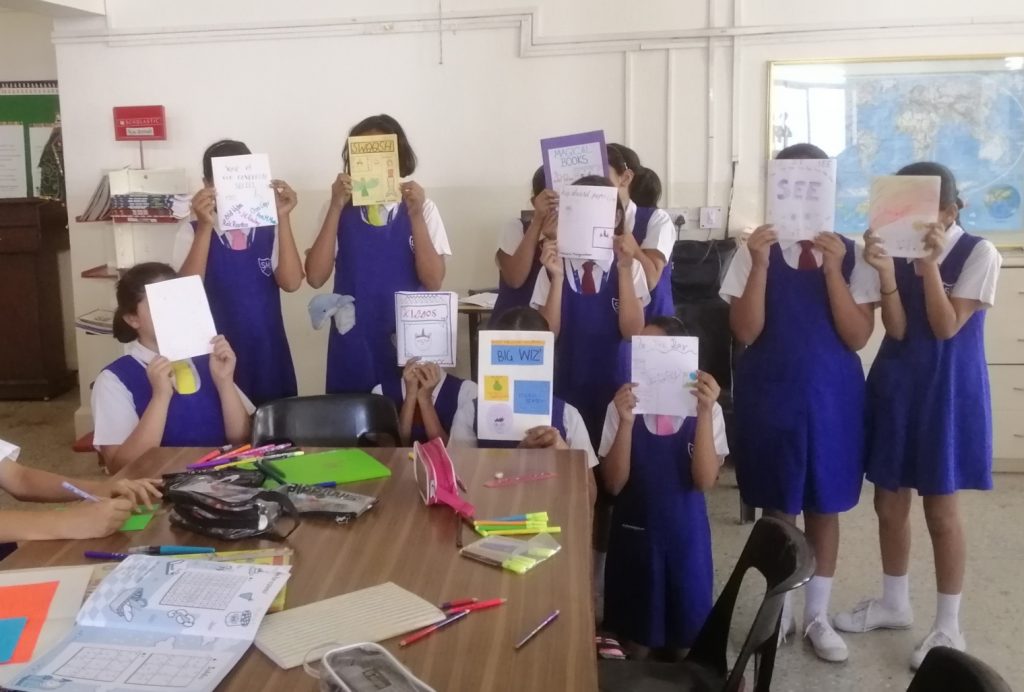
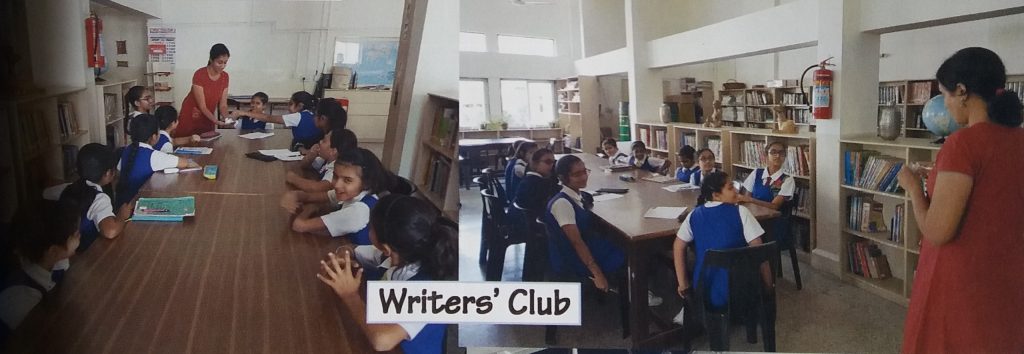
Also interestingly, I had nearly 100 participants who stayed with me right through the year at this offline, in-person writers’ club, and our magazine was all of 16 pages long.
At my online creative writing programmes, I have had between eight and 18 participants, and each issue of our e-magazine has been between 40 and 72 pages long.
Let me quickly say that not everything children write goes into the e-magazine! I want my participants to edit and rewrite, not submit first drafts. So, we’re talking about 40 to 72 pages of hard work, revisited and reworked many times over!
Why This Difference?
To me, the answer is clear. Online, children are comfortable. They are in their own safe spaces, free to express themselves without the distractions of borrowing an eraser from someone on the other side of the room or listening to whispers behind them. They are focused and interested. In the case of preteens and teenagers, at home, they are less concerned about the image they portray because they can simply switch off their cameras.
All in all, they’re in a space more conducive to learning, creating and imagining than a noisy classroom full of boisterous peers.
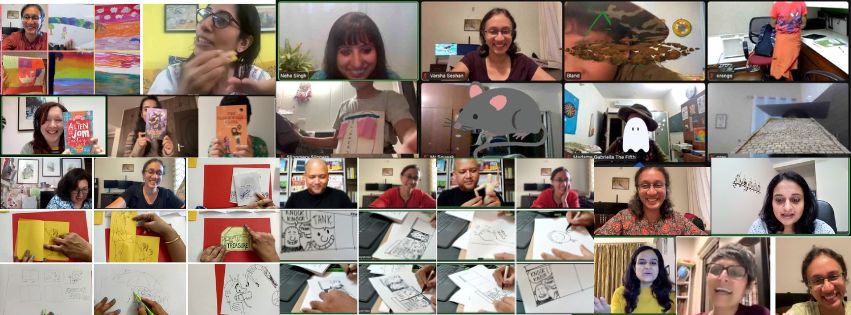
Taking This Further
Of course, I must share this with a disclaimer: I am not saying that all education is more effective online. There’s a big difference, for instance, between school and the workshops I conduct. Children join my sessions because they want to join. For the most part, they enjoy reading and writing, and when we remove distractions, they perform more freely, and consequently, better.
But the advantages of online workshops don’t end here. The children at my online writing programmes have the opportunity to interact with experts from all over the world. I have had guests from the US, Malaysia and the UK, as well as different parts of India–Mumbai, Kolkata, Bengaluru and more!
Safe spaces, the freedom to switch off your camera, spell check on your computer, fewer distractions, interacting with others from around the world … what’s not to like?
And that’s why, if you ask me what is better, online or offline workshops for children, I’m going to stick my neck out here and say ‘online’. For reading and writing, it’s online all the way.
If you would like to know about my online prgrammes (or even my offline ones!), join my mailing list. Alternatively, follow me on social media – Facebook or Instagram – for regular updates.
Strangus Derangus
March 7, 2024
Strangus Derangus & Other Adventures of Little Shambu is another book that I enjoyed hot off the press. It’s a collection of short stories, perfect for my book club because we can read three full stories together in class, leaving the other three for the children to read on their own.
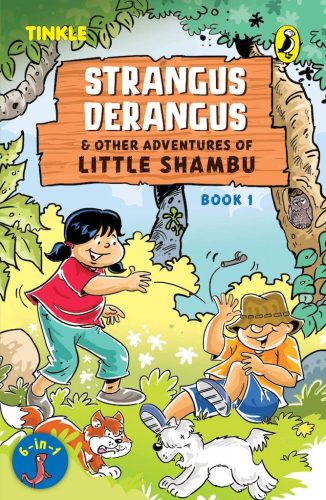
Role Play
There’s nothing like role play to help children understand how dialogue and all its complicated rules work! When we read The Reading Race and Yikes! Bikes!, I realised that although children love role play, many of them take a little time to figure out who’s saying what. By the end of it, though, everyone enjoys it tremendously.
Strangus Derangus & Other Adventures of Little Shambu is dialogue-rich, making it perfect for an activity of this sort!
Exhibition
In the story “Strangus Derangus”, Little Shambu sets up an exhibition of interesting things to show his friends, and he charges them to visit! What interesting things would you select for an exhibition? What stories could you tell about the things you select?
Animal Puzzles
Little Shambu loves animals, and so do most of the children I meet. It’s the perfect time to do a word puzzle on animals, and perhaps a few other animal activities too!
Join my book club!
Registrations are closed for this edition of my book club. The next edition will be held in June 2024. Join my mailing list if you would like to receive email notifications about my programmes. Alternatively, follow me on social media – Facebook and Instagram – for regular updates.
I’ve lost count of the number of times I’ve been asked how to inculcate the habit of reading in children.
My first response is always to tell parents to set the example–let children see you reading.
Then, create a culture around reading. Make reading fun, not educational!
And that’s why book clubs are great. They’re full of laughter and activities, making the experience of reading exciting, something that children can look forward to. The younger they start loving books, the more likely they are to keep reading!
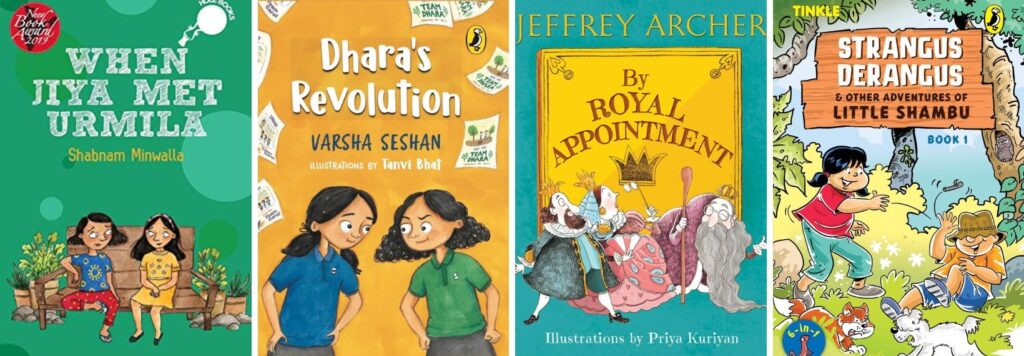
The Curious Case of the Sweet and Spicy Sweetshop
March 6, 2024
Ghosts, suspense, smart children and the most delicious-sounding foods come together in The Curious Case of the Sweet and Spicy Sweetshop by Nandini Nayar. Vishnudas Mithaiwala owns The Sweet and Spicy Sweetshop, and everything seems to be fine–until two children turn up claiming to be his estranged sister’s child! Whom should Vishnu believe? Whom should we believe? And more, what can we make of the fact that Laddoo begins to see ghosts in the house?
I enjoyed reading this book about rivalry and teamwork, secrets and emotion. It’ll be fun reading it with my book club too!
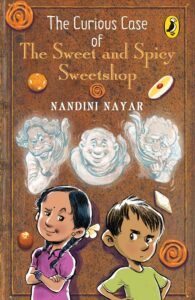
The Recipe Book
The Recipe Book is a family heirloom belonging to the owners of The Sweet and Spicy Sweetshop. In reality too, each family’s food is unique. Let’s find out about what foods we enjoy!
The best part about an online programme is the fact that children sign up from all over the world. This is a great place to polish our interviewing skills and learn about food from different cultures. In pairs or groups, we will explore foods that we associate with home, with festivals, and with grandparents. It’s time to find out more about one another and share ideas and experiences!
Character Sketches
Who is Revati’s child and who is an imposter? Halfway through the book, we’ll stop and look at all the clues we’ve collected. What do we know about the characters in the book, and how do we know what we know? Making predictions, drawing inferences and reading closely for detail make book clubs more engaging!
Ghosts
Laddoo can see ghosts! How would you react if you saw a ghost? Do you think people would believe you if you told them you could see–or sense–phantom-like beings?
Taking this further, we will engage in a little writing, exploring how we create the setting of a ghost story, based on what we want our readers to feel.
Join us!
THIS BATCH IS SOLD OUT!
The next edition of Read, Write, Explore will be held in June 2024. Join my mailing list if you would like to receive email notifications about my programmes. Alternatively, follow me on social media – Facebook and Instagram – for regular updates.
Read, Write, Explore is a reading programme that combines the joy of a book club with an introduction to creative writing. It’s perfect for children who enjoy reading and want to explore writing without the pressure of an intensive programme that involves editing and rewriting.
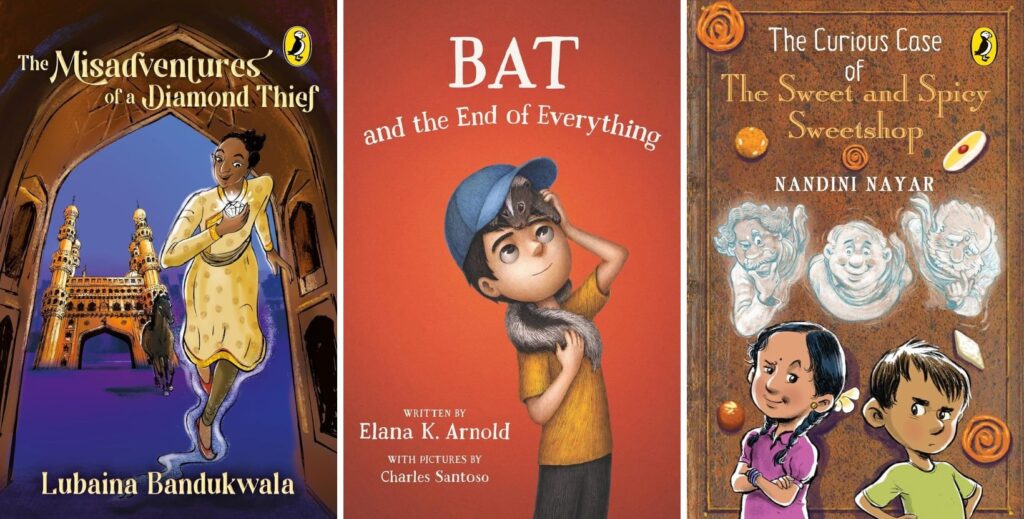
By Royal Appointment
March 5, 2024
Although I did read several books by Jeffrey Archer when I was in college, I never grew to be a fan the way so many of my friends were. Yet, I thoroughly enjoyed By Royal Appointment–rendered even more delightful by Priya Kuriyan’s illustrations.
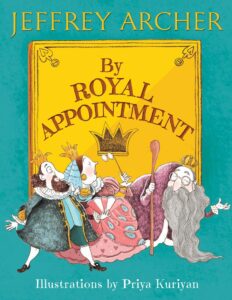
By Royal Appointment
There’s nothing like listening to the author read out a part of the book, and Jeffrey Archer has shared a 6-minute excerpt on his website, which we will listen to together. We will then try to design a “By Royal Appointment” seal, the one that we think will be found on every product tested by the King and Queen of Littleland.
Echo and Narcissus
The best part of reading a short book is that we have the time to explore so much else! Queen Echo of Littleland is a zany character, but she gives us the excuse to explore the word echo and the story that led to the creation of the word. What other stories can we make up about Echo? If Echo was a child, where would they live? What makes them repeat words and sounds?
Design a Car
One of my all-time favourite activities was when the children at my book club designed a chocolate while we read The Chocolate Touch. As we read a book that is all about very unusual cars, I would love for the children to design a unique car of their own.
Join my book club!
Registrations are closed for this edition of my book club. The next edition will be held in June 2024. Join my mailing list if you would like to receive email notifications about my programmes. Alternatively, follow me on social media – Facebook and Instagram – for regular updates.

Bat and the End of Everything
March 4, 2024
Exactly a year ago, I posted about A Boy Called Bat, which we read at the April 2023 edition of my book club. We loved the book, and the rest of the series has been on my mind ever since then. In April 2024, we’re finally going to read Bat and the End of Everything, the last book in the BAT series.
A lovely book with a neurodivergent boy at the centre, Bat and the End of Everything is a heart-warming story about family, friendship, and big emotional decisions. Bat knows–and has always known–that the skunk kit he adopted needs to be released into the wild. But what can he do to make his goodbye easier? Not giving it away, but the end of the book is the best part of the story!
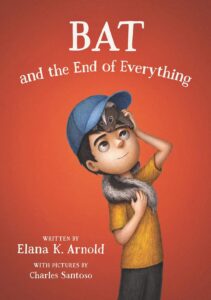
Animal Trivia
Each time I work with a book about animals, I’m amazed at the amount of trivia children know and want to share. This time, leading from a conversation about the lifespan of a rabbit in the book, we’ll play a quick guessing game about the lifespan of various animals. How long does a skunk live? What about a parakeet? Or a tortoise?
Figures of Speech
An aspect of autism that we often read about is the tendency to take things literally. We’ve worked with idioms before, but let’s get specific and work on animal idioms this time. We’ll also explore hyperbole and the way Bat responds to it in the story.
Creative Writing
Since Bat and the End of Everything is such a well-known book, there are several activities and learning resources available online. Using one of them, we will write one chapter that could come after the end of the book. As we write, we will explore not just facts and technique, but also point of view, making a conscious choice of whose voice we use to tell the next part of the story.
Join us!
THIS BATCH IS SOLD OUT!
The next edition of Read, Write, Explore will be held in June 2024. Join my mailing list if you would like to receive email notifications about my programmes. Alternatively, follow me on social media – Facebook, Instagram and Twitter – for regular updates.
Reading and writing go together, and especially for children who enjoy writing but aren’t yet ready for an intensive writing programme, Read, Write, Explore is ideal!

Dhara’s Revolution
March 3, 2024
It’s always a joy to read my books with my book clubs! I’ve read The Prophecy of Rasphora and Dragonflies, Jigsaws and Seashells, in addition to my story in Flipped: Mystery Stories and Sci-Fi Stories.
I can’t wait to read Dhara’s Revolution, a book that has received much love from readers, in addition to having been shortlisted for the AG BLF Prize for Children’s Fiction!
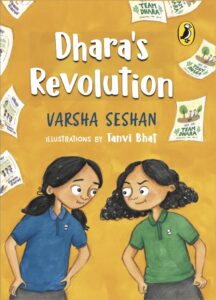
Revolutionary Ideas
If you want to create change, what would you do? Some of you may want to have the right to choose what uniform they wear. Others may want more screentime. What do you want? What is something that you want to do that you aren’t allowed to do? A book discussion is a great way to delve into a story!
Let’s Vote!
Election fever has gripped Dhara’s school, Sarvaloka Public School. Let’s read an excerpt from the book and then cast our votes. What team do you believe in? Online polls are a good way to explore how voting works.
Election Campaign
If you could change five things about your school, what changes would you make? Next, how would you convince your teachers that these changes are required? Brainstorm, and then create an election campaign, persuading the students in your school to vote for you.
Join my book club!
Registrations are closed for this edition of my book club. The next edition will be held in June 2024. Join my mailing list if you would like to receive email notifications about my programmes. Alternatively, follow me on social media – Facebook and Instagram – for regular updates.

The Misadventures of a Diamond Thief
March 2, 2024
When historical fiction and fantasy come together, we’re in for a treat! Rafu is a TTTD–a Time-Travelling, Thieving Djinn. Or at least, that’s what he’s supposed to be. The problem is that he is much more interested in food than gems. When the king of djinns challenges him to steal the Shah-i-Noor, Rafu strikes the perfect deal with his mother. If his mission is a success, it will be his last TTTD assignment and he will be free to open hist restaurant.
Unexpected allies and a healthy dose of luck help Rafu battle nefarious villains and get closer to the diamond. As he plans his escape route, he learns about the Char Minar and we explore the historical city of Haiderabad.
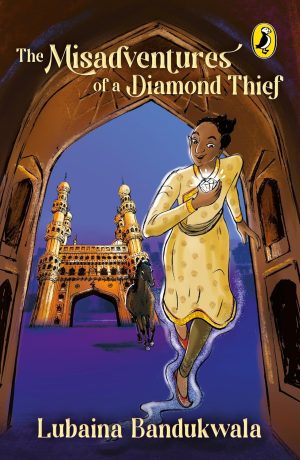
Monuments
The Misadventures of a Diamond Thief is a work of historical fiction that is full of possibility. In the author’s note at the end of the book, Lubaina Bandukwala says that there are many different points of view as to why the Char Minar was built and what it symbolises.
With the Char Minar as our starting point, we will attempt to explore monuments in each city my participants come from. I’m excited to learn a little about lots of places I might never have visited!
Sprites, Djinns, Genies, and More!
What is a djinn? Is it a genie? Through a word search puzzle and a quiz, we’ll explore magical, mythical and mystical creatures from all over the world!
Time-Travelling
Who isn’t fascinated by the idea of time travelling? With books like Fortunately, the Milk, we’ve worked on creating a time machine of our own, imagining places where we would go. We’ll explore time machines in literature and then work on a story outline, including setting, characters, a problem and a solution.
Join us!
THIS BATCH IS SOLD OUT!
The next edition of Read, Write, Explore will be held in June 2024. Join my mailing list if you would like to receive email notifications about my programmes. Alternatively, follow me on social media – Facebook, Instagram and Twitter – for regular updates.
Read, Write, Explore has been running since February 2021 and in the last three years, we’ve read over 40 books together, and at least three books more than once. I’ve had children sign up from all over the world–I’ve seen snow in Himachal, and the floods in Chennai. There’s nothing quite like meeting people from different parts of the globe and sharing stories!

When Jiya Met Urmila
March 1, 2024
I read Shabnam Minwalla’s When Jiya Met Urmila at least two years ago. I can’t believe I didn’t review it on my blog! I think I was probably waiting to use it at my book club, which didn’t happen for several reasons. I think we’d read too many books by the same writer–Lucky Girl, The Shy Supergirl and Nimmi’s Dreadtastic Detective Days. Whatever the reason, I’m so glad I noticed the book on my shelf again when I was choosing my books for the April edition of my book club!
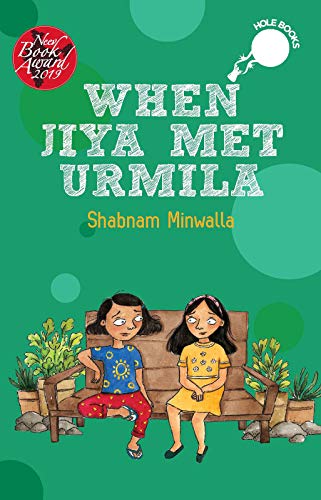
Peek and Seek
Just like Miss Nutty (aka Miss Rati), we’ll play Peek and Seek at the book club. Maybe I won’t ask the children to find a snail or a shoe flower. But I already have a list of things that we’ll try to find before our time runs out.
Super Similes
As I reread When Jiya Met Urmila, I loved all the unexpected ways in which Shabnam Minwalla uses words. It is foolish to count your flowers before they are plucked. Or the similes–teeth gleaming like butchers’ knives, moaning like a Martian with a sore throat, and dazed as a dead fish. What super similes can we come up with? How do we describe things, especially things that disgust or frighten us?
A Friend
Jiya and Urmila are as different as night and day … or maybe they aren’t. Through a guided writing activity, we will write a little bit about an imaginary friend who seems very different from us but turns out to be quite similar.
Join my book club!
Registrations are closed for this edition of my book club. The next edition will be held in June 2024. Join my mailing list if you would like to receive email notifications about my programmes. Alternatively, follow me on social media – Facebook and Instagram – for regular updates.
Do you know that we’ve read over 50 books at my book club for ages seven and eight alone? This is not counting books we’ve read more than once or books I’ve read with older readers!

My Year in Workshops: 2023
January 13, 2024
Writing sessions from the car. Book club sessions from a misal shop on the highway. Guest sessions in my dance class hall. 2023 was a year when I seemed to be juggling rather a lot, especially as my writing programmes were bursting at the seams, plus I started an in-person writers’ club at St. Mary’s School, Pune, once more!
Book Clubs
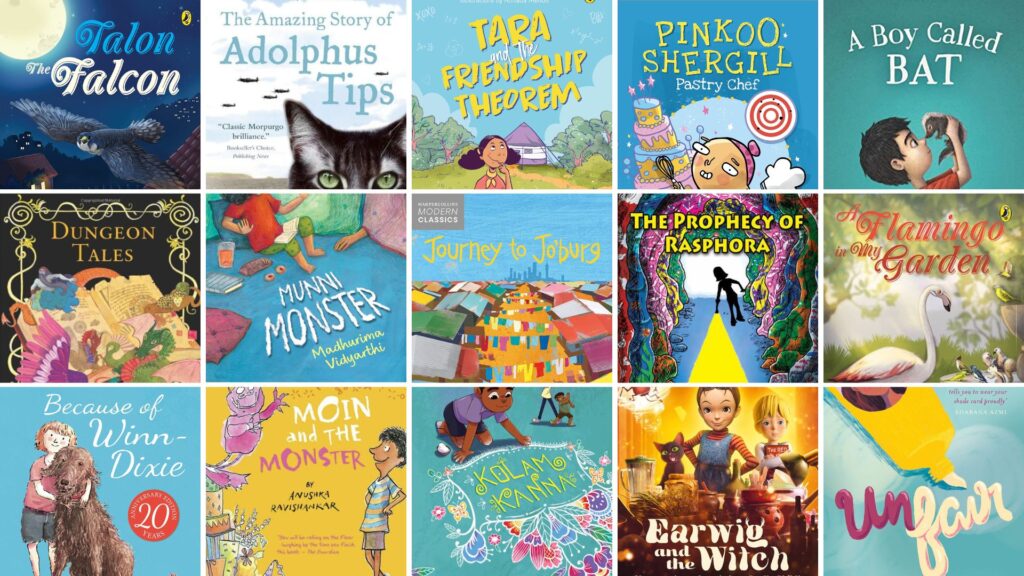
Juggling schedules was often difficult, but my book club for ages nine and ten saw a lot of new participants from different parts of the world. I had book clubbers from all over the country, as usual, but also London and Singapore! In 2023, I also met several of my regular book clubbers in person for the first time. In Bengaluru, especially, it was a joy to meet so many children who’ve read with me.
My book club for ages seven and eight was relatively slow. We did read several books together, but I hope for many more new readers in the year ahead.

Writing Programmes
Unlike my book clubs, my writing programmes have overflowed! In the April to June edition, I had eighteen children sign up across age-groups, forcing me to teach three batches, instead of my usual two. During the October to December edition too, I had fourteen children sign up–three batches again!
I also started teaching at St. Mary’s once more, and that has been more than a little overwhelming because I have over 60 children in each batch! I’m not used to classes that large, but it’s been fun interacting with children in person once more, working with all the forms of writing that I love.
I had six guests visit my writing programme too (virtually, of course), and each one was a treat.
We also launched the next issue of our e-magazine, WORDS, which you can read here. Issue 4 will be out later this month!
My in-person workshops go on as usual too, both teacher training session and author events with children. I’ve conducted writing workshops and training sessions in several cities, and I hope to meet many more children in the year ahead!
The Very Glum Life of Tootoolu Toop
January 7, 2024
We’ve read The Very Glum Life of Tootoolu Toop before and I can’t wait to read it again!
I know it’s longer than the books I usually choose, plus every batch of children is different, with mixed reading levels. Once more, I find myself asking, will it be too ambitious to read it in three classes with a bunch of children?
The answer is still the same – possibly.
Yet, there are so many things that draw me to the story that I am willing to take the chance again! It worked once; I know that for sure. Also, considering the number of children I meet who love fantasy, I think this will be a wonderful way to end the reading programme.
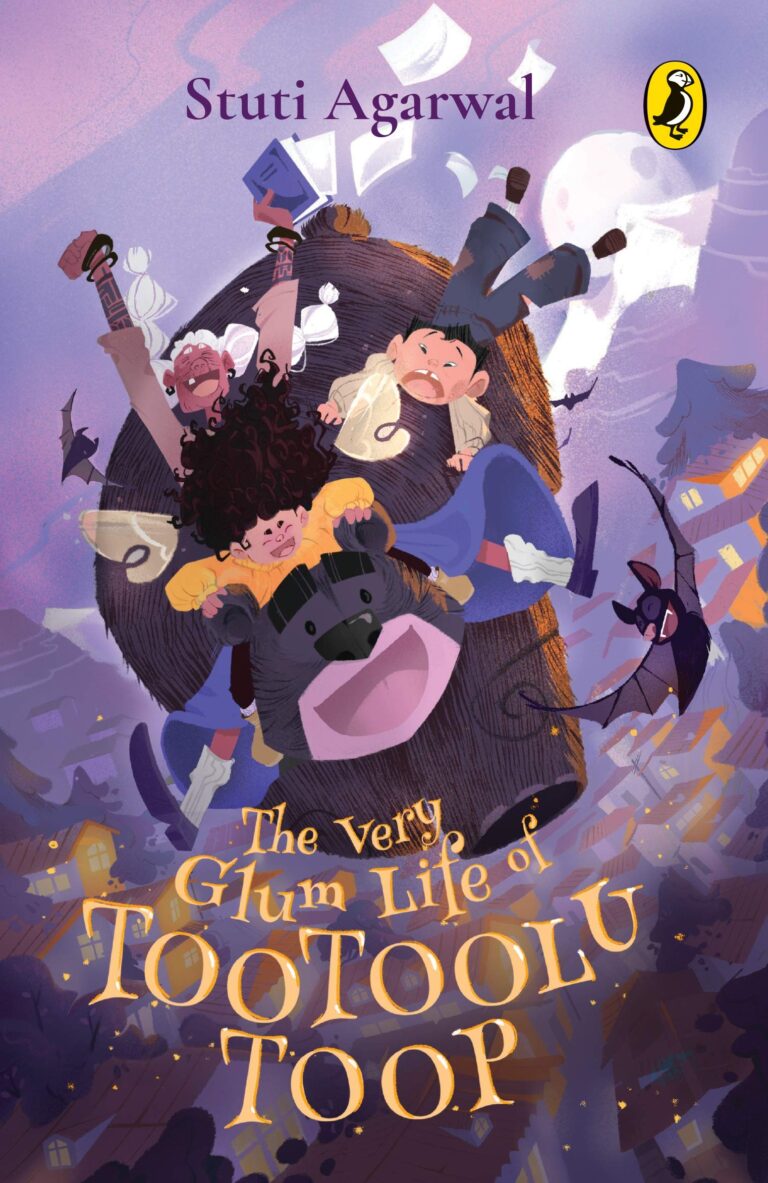
Magic
Stories about magic are fun to read and fun to write. What makes a magical world come alive? What magical words can we create?
Even when I reviewed Tootoolu Toop, I mentioned how I love the influence of Indian languages on the magical words in the book. Moving away from Latin and Greek to magical words of our own is going to be fun!
Creating a Witch
When we say the word ‘witch’, what do we think of? Let’s see if we can create an unusual witch–not the conventional black-cloaked creature, but not one like Hermione Granger either! We’ll try to be original and create something new!
Notes and Letters
One of the most delightful things about The Very Glum Life of Tootoolu Toop is all the notes she writes everywhere. The book opens with a letter and then, right through the book, we discover notes of all kinds. Writing notes is quick and easy, and it’s a lovely way to begin the process of writing. As the children read, I’d love for them to write notes to themselves and put them into the books. The notes could be as simple as ‘I love this’ and ‘This is funny’.
Join a book club!
REGISTRATIONS ARE NOW CLOSED FOR THIS EDITION OF READ, WRITE, EXPLORE.
New batches begin every alternate month. If you would like to receive email notifications about my programmes, please fill this form. Alternatively, follow me on social media – Facebook, Instagram and Twitter – for regular updates.

The Canary Caper
January 6, 2024
It’s been 25 years since The Canary Caper was published, and it’s still such a joy to read! We read the first of the A to Z Mysteries, The Absent Author, in April 2021. When I met the some of the same children again in June, several of them were devouring the rest of the series. I’m now looking forward to introducing the series to a new set of enthusiastic 7- and 8-year-olds!
As I read The Canary Caper, I was struck by many little details. On the one hand, I was upset about the animals in the circus. Of course, this is something we will discuss at my book club–animal rights. On the other hand, I was delighted that Ruth Rose pooh-poohs the idea of becoming a car salesman because she wants to be President! And then, she rubs it in by adding that it’s saleswoman, not salesman. Reading the book with my book club is going to be such a delight!
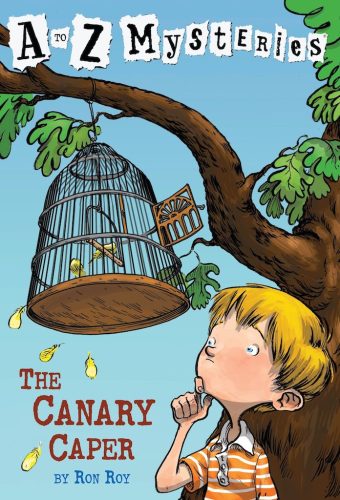
Alliteration
An activity always accompanies the introduction of the word ‘alliteration’ to my book club! The A to Z Mysteries all have alliterative titles. How many others can we think of? If we had to create an alliterative book title with our own names, how would we do it? And finally, can we take alliteration further to create a tongue twister?
Puzzles
A detective story is really a complex puzzle. The clues are in front of us; we just need to put them together to solve the mystery. This is the perfect way to introduce other puzzles – a code, a word search puzzle, and so much more!
Writing a Simple Detective Story
A detective story is arguably the most satisfying kind of story to read. Using a story worksheet, we’ll try to write a simple detective story of our own.
Join my book club!
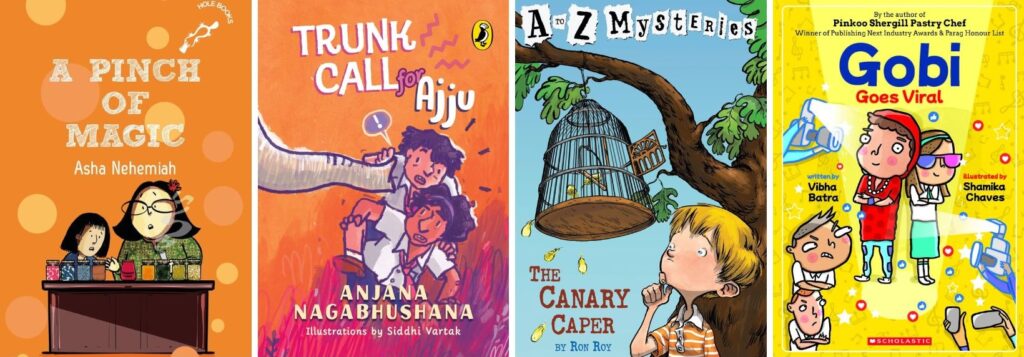
An Alien in the Jam Factory
January 5, 2024
An Alien in the Jam Factory is such a fun read! A book that celebrates ideas is the best kind of book to read with children. The very first page is filled with doodles and ideas–like a jam slice, which is like a cheese slice that you can put straight into a sandwich. What else can we do as we read the book?

Food Ideas
Create your own wacky jam recipe! Scooter, the protagonist of An Alien in the Jam Factory, creates wasp-repelling jam, Brussels sprout jam, cherry bomb jam and more. What can we make? What kind of jam do the children at my book club think will be fun and delicious? Waiting to find out!
Alien
Creative writing is an integral part of my book club for ages nine and ten, so let’s imagine aliens of our own. If an alien landed in your balcony, what would you do? What problems would you face and how would you solve them? Would you be willing to go visit their planet with them?
Persuasive Writing
We worked with persuasive writing during my creative writing programme last year; it’s always fun. Scooter wants to convince his mother to let him keep a pet–this is a common argument children have with parents! What if you wanted a pet? How would you convince your parents to let you get one? What promises would you make?
Join a book club!
REGISTRATIONS ARE NOW CLOSED FOR THIS EDITION OF READ, WRITE, EXPLORE.
New batches begin every alternate month. If you would like to receive email notifications about my programmes, please fill this form. Alternatively, follow me on social media – Facebook, Instagram and Twitter – for regular updates.

Trunk Call for Ajju
January 4, 2024
Even when I read and reviewed Trunk Call for Ajju in June 2023, I knew it would be one of my book club reads soon enough. A book about children and animals always holds a special place in my heart, and elephants are extra special. Here’s what we’ll do as we read the book.
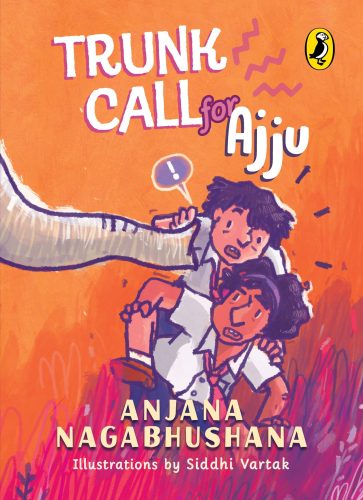
Money-Making Ideas
Children’s business ideas are fascinating! If you had to raise money for a cause you believed in, what would you do? How do you think you could make money?
Just like Making Millions and Amelia Bedelia Means Business, Trunk Call for Ajju is the perfect book to explore entrepreneurship!
Talent Show
Ajju and his best friend Karthik take part in a talent competition that they’re determined to win. What would you do to win a talent show? In the past, at my book clubs, we’ve had all kinds of performances – piano, solving Rubik’s cubes, the flute, recorder … It’s time to step out of our books and find out about one another’s talents again!
Animals
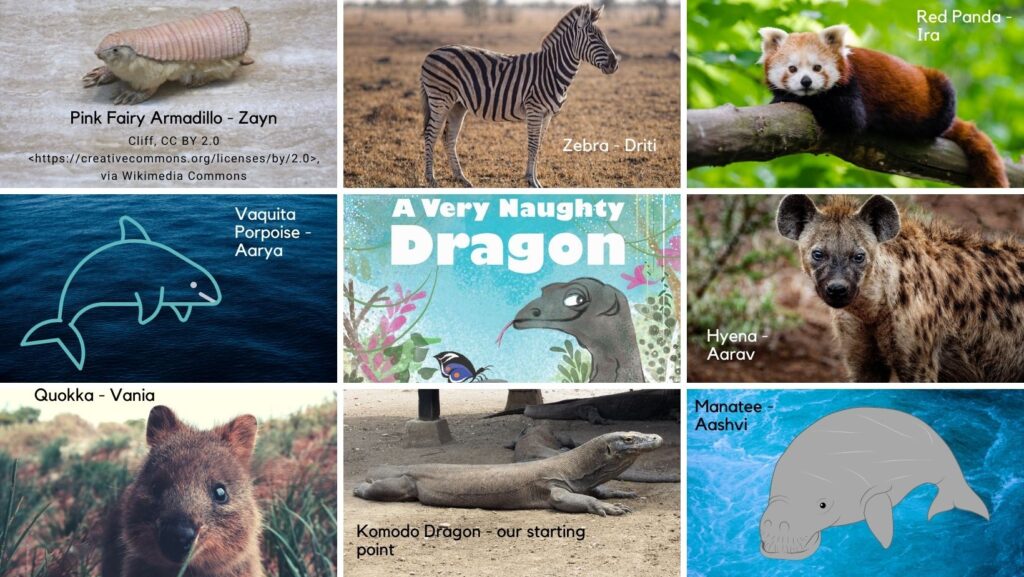
When we read A Very Naughty Dragon, I asked each child to tell me a little about an animal they love. I’ve done a similar activity with the children at my book club for older readers too, and I’ve learned about all kinds of creatures. Since this book is about an elephant in Zimbabwe, we’ll focus on African animals. What animals do we find in Africa? And in which country are these animals found? Let’s explore!
Join my book club!

When the World Went Dark
January 3, 2024
I read When the World Went Dark one year after our first lockdown. And I wondered about including it at my book club. Grief is deeply personal. No one feels the way you feel. It almost feels unfair when people do.
Even so, we do want to talk about our grief. Additionally, with any book, we take away what we want to take away from it. The lockdown, online classes and the fear of the virus are so real that I want children to read this, a book about their lived reality, one that acknowledges that not all adventures happen outdoors when we are free to run about and play.
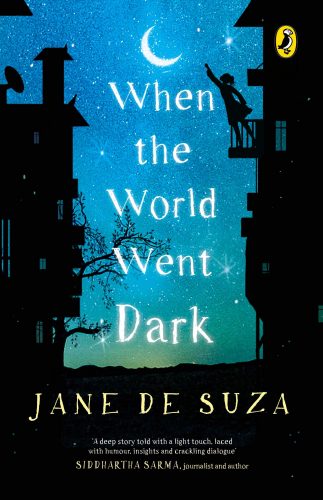
Book Discussion
For When the World Went Dark, the discussion will lead the way. Children will want to talk about lockdown, loss, online school and more; I am sure of it. When the cook of one of the children at my book club caught covid, the child was so horrified he could not stop talking about it. And in all these months, I’ve met just ONE child who likes online school more than physical school! With a book like this, the conversation will lead itself.
Detective Stories
Swara, who is almost nine years old, shares a special relationship with her Pitter Paati. They find clues and solve mysteries together, so much so that Pitter Paati calls her Little Miss Marple. Unfamiliar with Agatha Christie’s detective, Swara checks that PP does not mean Little Miss Muffet, and eventually settles with Little Miss Marble.
What famous detectives do we know? From Sherlock Holmes to Poirot, the Secret Seven to the A to Z Mysteries, let’s discover what detective stories have in common before we write our own!
Puzzles and Clues
Swara wants her Pitter Paati to send her a clue, any clue that will help her find her missing grandmother. Because she cannot believe that Paati is gone. The girl hunts for clues everywhere – in the lights flashing in the picture hanging on the wall, in socks, in everything.
Solving puzzles based on clues is immensely satisfying! I love logic and logical puzzles myself, so I provide participants with a set of clues based on which they have to solve small mysteries of their own!
Join a book club!
REGISTRATIONS ARE NOW CLOSED FOR THIS EDITION OF READ, WRITE, EXPLORE.
New batches begin every alternate month. If you would like to receive email notifications about my programmes, please fill this form. Alternatively, follow me on social media – Facebook, Instagram and Twitter – for regular updates.

A Pinch of Magic
January 2, 2024
We’ve read Trouble with Magic at my book club; it’s time to read the sequel! A Pinch of Magic is a fun read, full of surprises. I read and reviewed the book some time ago, and I’m excited to be introducing it to my book clubbers. Here’s what we’ll do with it.
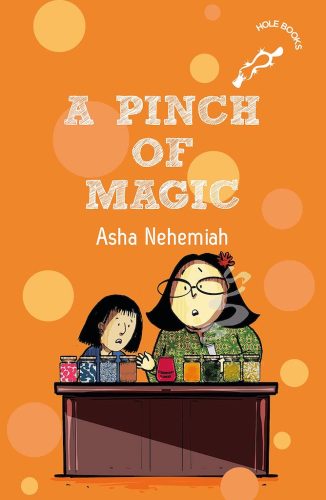
Innovative Address
One of the first things that made me chuckle as I read A Pinch of Magic was the Maha Guru’s highly accurate address. And this leads us to our first activity. How would you write your address if you did it in a similar fashion?
I love linking screen time with the world around us. Looking around them, I want the children to tell me: what tree is closest to them? What is the shape of tree near the gate? How tall is the tree at the end of the lane? Together, we’ll create an innovative address for each one of us!
Label Design
We thoroughly enjoyed creating different kinds of chocolate when we read The Chocolate Touch. We took it step by step, choosing our ingredients, creating a recipe, naming the product and pricing it.
With A Pinch of Magic, I want the children to take a name from the book – Simply-Dab Cavity Repair Gel or Baby-Soothing Gum Jelly – and design a label for it. I know the children will surprise me with their creativity!
Measurements
A book that is all about a broken pinching spoon is the perfect introduction to the idea of measuring tiny things. Drawing from a journal-writing activity I did at my writing programme recently, we’ll write a few details about ourselves, measuring as we go along. How long is your little fingernail? Do you have any scars? Measure them! Use a string and measure your knee. I’m waiting to do this with the children!
Join our book club!

The Diary as Story
December 6, 2023

In just a few weeks, yet another writing programme will come to an end! Yesterday was the third and last guest session of the season–a creative writing workshop with children’s book author Sowmya Rajendran.
I love it when guests reinforce something I’ve been talking about for a while. During yesterday’s session, it was ‘write what you know’. Of course, I do give children the opposite advice too–write what you don’t know–but the point, for me, is to bring stories into familiar contexts.
When Sowmya told us about how her book Mayil Will Not Be Quiet was born, she stressed that she and her co-author Niveditha Subramaniam wanted to write a book about being a child in India. What is it like to go to an Indian school? What sort of conversations do we have at home? This idea is well worth repeating, especially as most children continue to write stories about Michael and Felicity, who live in Massachusetts (which, of course, many cannot spell)!
Sowmya spoke about the importance of an authentic voice because finally, it’s the voice that will keep the reader invested in the story. Step by step, she led us through the process of making the diarist’s voice feel real. For one, we must have a clear idea of the character. For another, we need to look at the character’s social circle because naturally, a diary would be full of stories about people around this character.
From character and form to little quirks and doodles, Sowmya helped us make our epistolary story believable. It’s with conflict that a story really becomes a story, and that’s what we explored through yet another writing activity.
Just like that, we’ve had three rewarding guest sessions, creative thinking, and a lot of writing. The last writing programmes of the year with fourteen young writers are racing to an end!
Stories: Comic-Page Style
November 19, 2023
What a rewarding session we had with Nandita Basu! At workshops like this one, I think I learn as much as the young writers who sign up.
Step by step, Nandita led us through the creation of one page of narrative that brings together text and illustration in the style of a graphic novel. We launched straight into the workshop with an interesting prompt that made all of us think. We’ve all wronged someone at some point in our lives; there’s been a time when we were needlessly nasty to someone who didn’t deserve it. This formed the basis of the plot we went on to sketch over the next hour.
Layouts, structure, characters, setting, conflict, emotion … in a single hour, Nandita led us through the whole lot. How important is background when setting the context of our story? Is it all right to make stick figures rather than fully detailed characters? How large or small should the characters be in a given box?
Ten minutes at a time, Nandita led us through the creation of a one-page story. We created the setting and conflict first, and then moved on to emotion and the climax of the story.
Nandita urged us not to rush, but to take our time to finish. I’m waiting to see what the participants came up with!
Green Stuff and Nonsense
October 27, 2023

What a fun session we had on green writing with Bijal Vachharajani! In a single hour, we spoke of a million creatures from elephants to frogs, ferrets to spiders, lion-tailed macaques to slugs that aren’t slugs.
Bijal’s workshop was a guest session at my writing programme. We’ve just reached the end of our poetry module, so it was the perfect time to invite a guest to do a workshop for us, and I thought of Bijal because the Art is Everywhere series – which Bijal has co-authored – is one of my favourite sets of rhyming verse. I loved how she led us through the workshop yesterday, beginning with a free writing exercise for us to shed our inhibitions and get writing and then moving on to more structured writing.
In the central element of the workshop, Bijal showed us seven images (all taken by one of her co-authors Radha Rangarajan), and asked us to write two lines of poetry about each one. Here are the animals we wrote about:
- Jumping spider
- Asian elephant
- Baya weaver bird
- Lion-tailed macaque
- Bush frog
- Mudskipper
- Ghost crab
I loved what the children shared!
Guest sessions add a vibrancy to the writing programme. The best ones sparkle and stand out, making us excited to write again. The next guest session is already in the pipeline, and it promises to be just as much fun!
Kittu’s Very Mad Day
September 7, 2023
I remember meeting Harshikaa Udasi, author of Kittu’s Terrible Horrible No Good Very Mad Day at a lit fest several years ago. I had read her book already, but unfortunately, I had a Kindle edition, so I couldn’t go up to her and get my copy signed. I told her that, and then, casually, a few days later, she texted me and asked me for my address. I sent it to her, and in a few days, I had a parcel at my door–my very own signed copy of the book!
It’s time to introduce this zany book to my book clubbers. Kittu is a more difficult read than the others in this time’s selection, but I’m quite certain that won’t make it any less enjoyable.
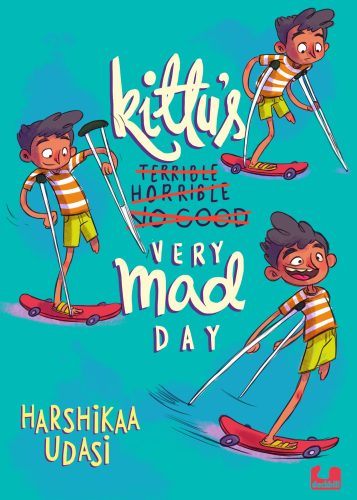
Being Lost
In the opening scene of Kittu’s Terrible Horrible No Good Very Mad, Kittu is lost. Unlike most other children who are lost, however, he seems to think of it as some sort of adventure. This is the perfect moment for the children to share stories of times they thought they were lost, and what they did about it.
The World's Most Chaotic Family
Kittu may belong to the world’s most chaotic family, but our families can be quite chaotic too! Let’s explore just how chaotic. On the screen, I’ll invite each child to draw two interesting members of their family. What if all these people went on holiday together? Where would they go and what do the children think would happen?
Family Tree
Making a family tree might be challenging for a seven-year-old, but it’s still fun! We’ll try to make a simple one, writing down one sentence about each person on the tree.
Join my book club!
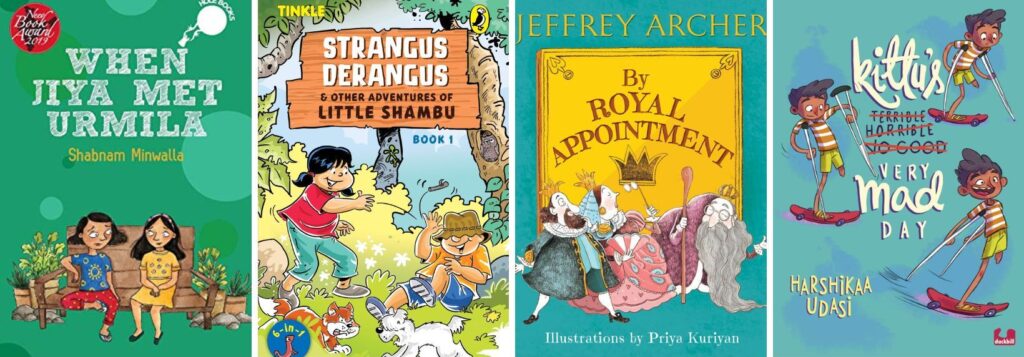
Unfair
September 6, 2023
I read Unfair quite some time ago, and what I loved most about it is how pacy it is. One chapter just rolls into the next, making it the perfect read for my book club.
From discussing themes to exploring narrative voices and structure, there’s so much I can do with a book like Unfair!
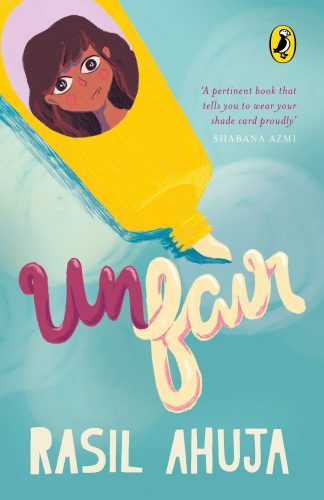
Discrimination
What does discrimination mean?
At my writing programme last year, we worked on writing persuasive speeches, and I was stunned by the kinds of things children write. Two children – one boy and one girl – chose to write about gender equality, and both speeches were powerful in their own ways.
Especially as my reading programme for ages nine and ten has an important creative writing element, we will begin with a discussion on discrimination, and move on to writing persuasive texts on the subject.
Narrative Voices
Unfair employs two narrative voices – Meher’s and Lina’s. How do writers choose a point of view to tell a story? What are the different kinds of narrative voices? We will do a short exercise on changing the narrative voice, exploring how a story changes based simply on who is telling it.
Auditions
I love bringing drama into my reading programmes. I’ve done it with very young children (like when we read Manya Learns to Roar), as well as with older ones. When children learn and recite poetry, they throw themselves into the act and make it a performance to remember!
A story about auditioning for a part in a play is perfect to explore a little bit of drama, elocution and performance!
Join a programme!
REGISTRATIONS ARE NOW CLOSED FOR THIS EDITION OF READ, WRITE, EXPLORE.
New batches begin every alternate month. If you would like to receive email notifications about my programmes, please fill this form. Alternatively, follow me on social media – Facebook, Instagram and Twitter – for regular updates.
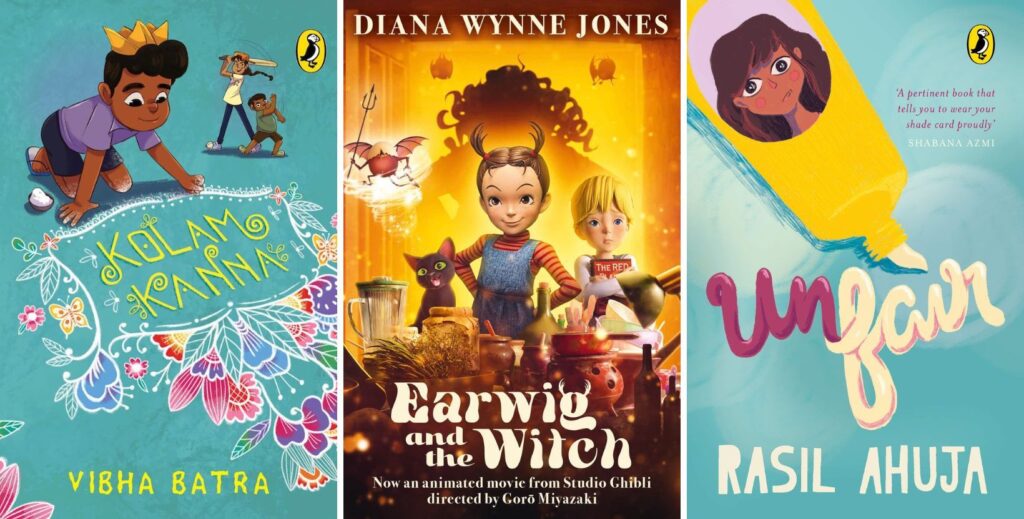
Earwig and the Witch
September 4, 2023
When I learned that Earwig and the Witch is a movie too, I debated a long time over whether to read it with my book club or not. Finally, I decided that whether the children I meet have watched the movie or not, we can read and enjoy the book together. In fact, those who’ve watched the movie will be able to compare book and movie, which is always an interesting exercise!
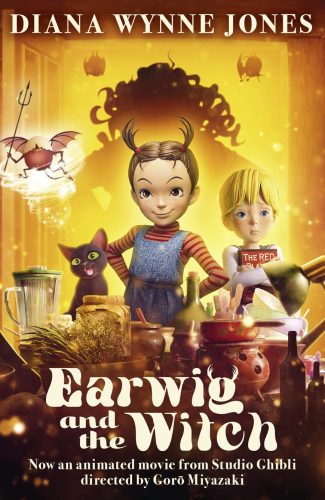
Vocabulary Brainstorm
Before we start reading Earwig and the Witch, we’ll do a quick written activity on word association. What words come to mind when you think of the word ‘orphanage’? How about ‘adopted’? ‘Witch’? ‘Spells’? Once we have a few ideas, we’ll get reading!
Horror and Fantasy
Horror is not a genre I work with often at my book club. In fact, it was after much hesitation that I introduced The School is Alive, and I’ve set aside several books that I know I would have found too scary to read as a child.
Yet, when horror and fantasy come together, there’s often a little thrill, as I know from the Creepy House reading challenge at the British Library. In groups we will explore themes, characters and ideas that are often associated with horror, and see whether we can write a little scary scene of our own.
Protagonists and Antagonists
Books which challenge the idea of the traditional hero of a story are always interesting. As we read Earwig and the Witch, we will try to create a character that is not necessarily loveable, but has spunk and can hold her own no matter who her adversary!
Come, read with us!
REGISTRATIONS ARE NOW CLOSED FOR THIS EDITION OF READ, WRITE, EXPLORE.
New batches begin every alternate month. If you would like to receive email notifications about my programmes, please fill this form. Alternatively, follow me on social media – Facebook, Instagram and Twitter – for regular updates.

Kolam Kanna
September 2, 2023
October 2023 sees us reading another brand-new book, hot off the press! I read Kolam Kanna just about a month ago, and I loved it. What’s not to love about a kolam-drawing child with friends who stand up for him? Here’s what we’ll do as we read this book.
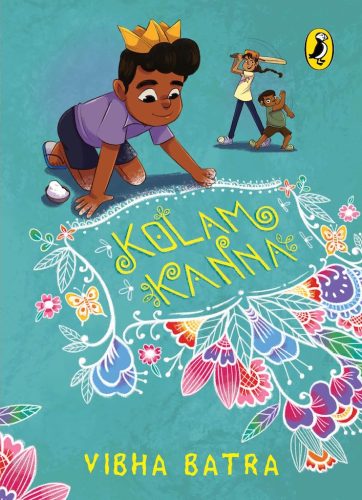
Kolam
Have you read Susheela’s Kolams? If we can, we will read the story together. But whether we can or not, we will try to make a kolam in class. I remember being fascinated by kolams because of the geometry and patterns. I was never good at drawing, but I loved the idea of creating a simple but quite fancy-looking kolam all based on a framework of dots.
I’ve written about art integration before. It’s an important part of learning!
Themes
All too often, book club discussions follow the pattern of ‘what-do-you-think-of …’ This time, I would like the children to discuss what they think the themes of the book are. Will they talk about diversity? The class divide? Gender stereotypes? Without nudging them in a direction of my choice, I want to see where there conversation will go!
Dialogue Writing
I love the use of dialogue in Vibha Batra’s books! Using an excerpt from the book as our mentor text, we will explore dialogue writing, paying attention to both our choice of words and the structure of dialogue.
Come, read with us!
REGISTRATIONS ARE NOW CLOSED FOR THIS EDITION OF READ, WRITE, EXPLORE.
New batches begin every alternate month. If you would like to receive email notifications about my programmes, please fill this form. Alternatively, follow me on social media – Facebook, Instagram and Twitter – for regular updates.

Moin and the Monster
July 6, 2023
I’m rereading Moin and the Monster with my book club! I read it in June 2021, and all those who read it with me are now too old to be part of Read, Write, Explore, so it’s time to introduce it to a fresh batch of children.
At my last creative writing programme, one of the children wrote a story about a pink 2D zombie the size of a pineapple coming to life. I immediately thought of Moin and the monster! How could I not? And I knew I had to read the book again.
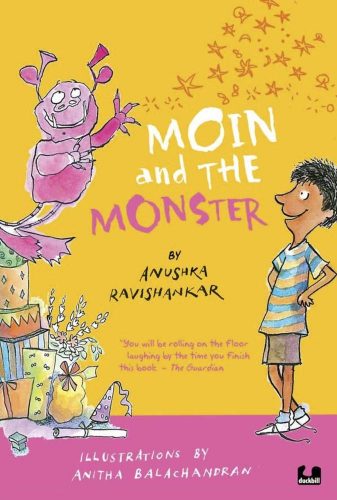
Rhyme
Everyone loves rhyme. For me, the biggest problem with poetry that children write and send me is forced rhyme without a sense of rhythm. Sure, sometimes it works. Maybe. But most often, it does not.
When do we use rhyme and why? What kind of poems would you like to write? What kinds of poems do you read?
Beginning with a discussion, I hope to write a little poetry together.
Surprising the Reader
Quirky, humorous stories are difficult to write, but one place to begin is by surprising the reader. I love it when a story surprises a laugh out of me! What monster rules can we create to make readers laugh? How else can we bring in the element of surprise?
Through free writing activities and story worksheets, we’ll try to create that unexpected jolt which makes us chuckle.
Making a Drawing Come Alive
What if the last thing you drew came to life? What would we meet and what problems would you face with it?
Come, read with us!
REGISTRATIONS ARE NOW CLOSED FOR THIS EDITION OF READ, WRITE, EXPLORE.
New batches begin every alternate month. If you would like to receive email notifications about my programmes, please fill this form. Alternatively, follow me on social media – Facebook, Instagram and Twitter – for regular updates.
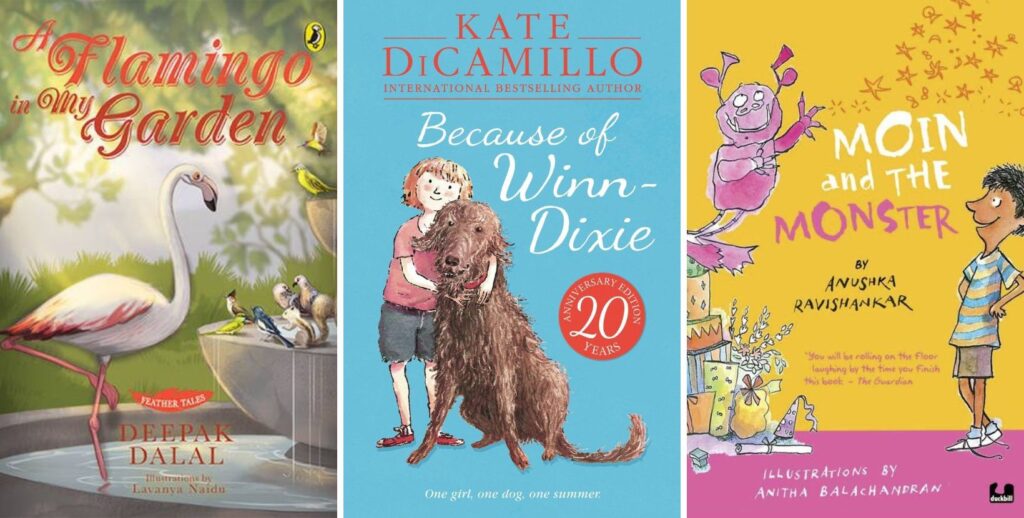
Because of Winn-Dixie
July 4, 2023
Kate DiCamillo’s Because of Winn-Dixie has been on my list of books to read for a l-o-n-g time. Yet, I didn’t get around to reading it until I thought of introducing it to my book club. And I’m so glad I did! It’s a gorgeous book. It’s the kind of book that makes your heart ache and swell with its sweetness and its gentleness.
India Opal’s mother left her father and her, and it’s because of Winn-Dixie, a dog she adopts at the spur of the moment, that she begins to come to terms with her loss. Not just that; all thanks to Winn-Dixie, she makes friends and learns what it means to be part of a community where everyone not only has a story to share and but also has ghosts that haunt their past.
I can’t wait to read it with my book club!
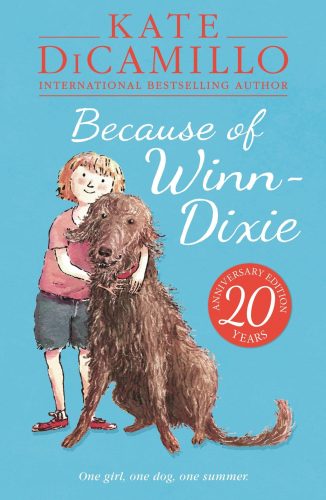
Vocabulary
Playing with words is always fun! I have three vocabulary activities in mind for Because of Winn-Dixie. One, before we start reading, we’ll do a word search puzzle and then string together some of the words to build a story of our own. Next, we’ll try to make a list of words we associate with dogs. And finally, we’ll do a crossword puzzle based on the book. There are so many resources available online; I hope to use at least some of them!
Ten Things
As Opal is ten years old, she asks her father to tell her ten things about her mother. What ten things would you tell us about a parent or best friend? Do you think they give us a clear picture of what the person is like?
Letter to Mom
There are so many writing activities we can do with Because of Winn-Dixie! One thing I would love to explore is to get into Opal’s character and write a letter to her mother about Winn-Dixie. What would Opal say? Writing a little about how she feels about each of her new friends would be a great way to begin!
Come, read with us!
REGISTRATIONS ARE NOW CLOSED FOR THIS EDITION OF READ, WRITE, EXPLORE.
New batches begin every alternate month. If you would like to receive email notifications about my programmes, please fill this form. Alternatively, follow me on social media – Facebook, Instagram and Twitter – for regular updates.

A Flamingo in My Garden
July 2, 2023
We’ve read Talon the Falcon, The Golden Eagle and The Paradise Flycatcher. How can we not read A Flamingo in My Garden?
The entire Feather Tales series is stunningly illustrated in full colour, and that is most certainly part of the charm. Like The Golden Eagle, A Flamingo in My Garden is a story within a story. Mitalee is delighted to see a flamingo in Rose Garden, and she watches as her favourite squirrel–whom she calls Snowdrop–and the birds chatter together. In that little circle of birds, the skybird Longtail tells the story of how Sunglow the flamingo found his way to Rose Garden. It’s a lovely story full of suspense and the universal theme of good versus evil.
Here’s what we will do as we read the book.
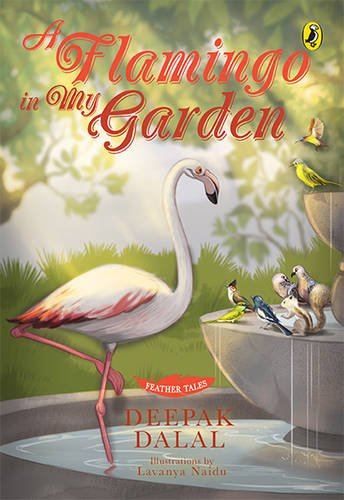
Words
The sea is called bigwater. Police-birds are skybirds. Terra-staan is the earth.
During author events on The Prophecy of Rasphora, I often do an activity where children make up Rasphoran words for various English words. Similarly, as we read A Flamingo in My Garden, we’ll make up words in a language of our own – not bird-language, perhaps, but perhaps pup-language or bug-language!
Bird Similes
We’ve worked on bird idioms several times; it’s time to work on bird similes. How many do we know? As wise as …? As happy as …? As proud as …? Let’s explore!
Freedom
Just like The Golden Eagle, A Flamingo in My Garden is a story about freedom. Especially as this is the first book we will be reading in August, it will be the perfect time to talk about independence and the freedom struggle. What does freedom mean to you? Can we work on a piece of guided writing based on the idea of freedom?
Come, read with us!
REGISTRATIONS ARE NOW CLOSED FOR THIS EDITION OF READ, WRITE, EXPLORE.
New batches begin every alternate month. If you would like to receive email notifications about my programmes, please fill this form. Alternatively, follow me on social media – Facebook, Instagram and Twitter – for regular updates.

Art Workshop with Kripa
June 16, 2023

Each time a new writing programme begins, I feel it whizzes by. Twelve weeks are nearly over, and here we are, after our last guest session of the programme, an art workshop with art educator and children’s illustrator, Kripa. It was such a treat!
I’ve been looking at Kripa’s art for a while, and I love it. Her tea journal, her little dough babies, her city sketches … each picture she shares on social media is stunning. Art and writing go together, no matter how much I may say that I cannot draw at all, and that is why I invited Kripa to conduct an art workshop for us.
Watching all the children fill their pages with colour warmed me up. It’s a joy to watch them engage in the reflective experience of creating art, and I loved how Kripa guided them through it. The title of the workshop itself is lovely, isn’t it?
Purple sea and pink sky,
Nothing in art is a lie.
Kripa began by showing us her gorgeous artwork featuring the sky and the sea. Often, we restrict ourselves to traditional colours when we draw. The sky is blue, the sea is blue-green, and land is brown. Yesterday’s session was about experimenting with these colours, by using bold, unconventional colours to express ourselves.
I also loved Kripa’s first and most important rule: don’t erase. There are no mistakes! She asked the children to imagine that their eraser had fallen into the sea, or better, that the eraser had not been invented yet.
Beginning with a single horizontal line, Kripa taught them about positive space and negative space. Using non-traditional colours, the children explored mixed media to create seascapes of their own. Even as they worked, Kripa spoke about strokes, both for oil pastels and for poster colours, encouraging the children to create layers.
And voila! In an hour, each of the children had a work of art to show. I’m waiting for them to finish their pieces and send me pictures, but the little we saw was lovely too.
With that, another set of workshops comes to an end. But before I know it, October will be here, and I’ll be planning my next set of guest sessions …
Bookaroo Srinagar 2023
June 14, 2023

What can one say about a literature fest without being repetitive? Lit fests are special. They fill you up with energy and enthusiasm. They remind you of the joy of reading, writing, and stories.
And lit fests in beautiful spaces? They’re inspiring. Srinagar is lovely, and equally, Delhi Public School, which hosted Bookaroo, was charming. Look where I conducted both my sessions!

Over the last few years, I’ve been invited to several lit fests. Last year alone, I did events at lit fests in Vadodara, Gurugram, Jaipur and Pune, in addition to smaller ones at various schools in the country. I’ve shared pictures and anecdotes, and at the risk of repeating myself, I will say that lit fests always leave me on a high.
Yet, for a writer, lit fests are a means to an end. They’re a way for children to get to know about our stories. They help create some shelf space for our books at stores that are dominated by Percy Jackson, Harry Potter, the Famous Five, and Geronimo Stilton.
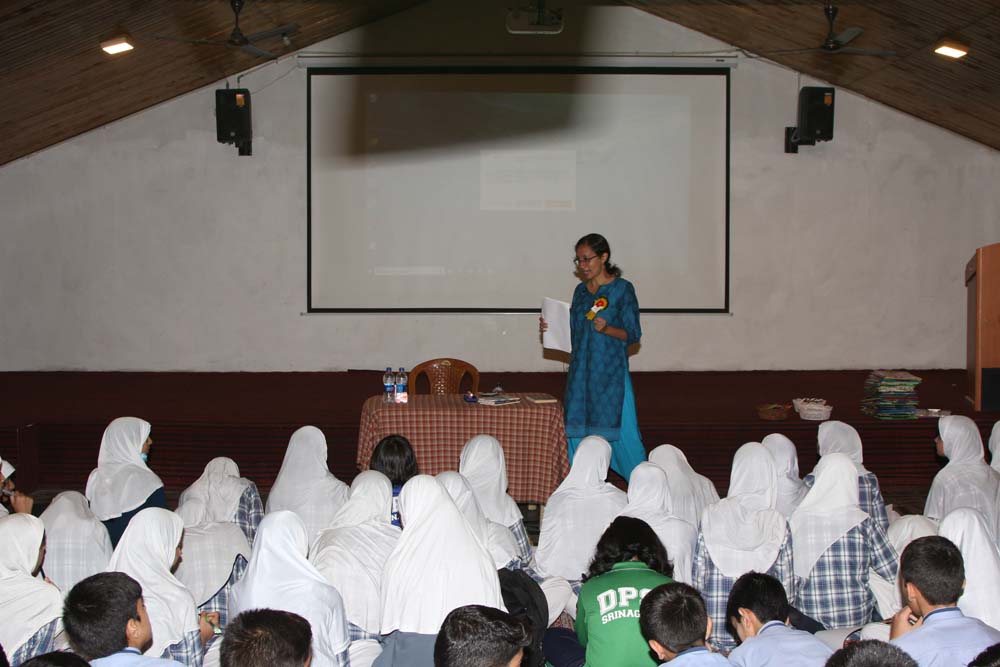
Of course, the author interactions themselves are lovely. It’s grand to address a full house and have dozens–sometimes hundreds–of enthusiastic children in the audience. But we are finally writers first. We want our stories to be read.
And that’s what makes Bookaroo truly special. The fact that there is a space for authors to be seen. Their books are celebrated, not just for the way they bring children together at an event, but for the way they bring children together through the stories themselves.
Authors are notoriously shy, and I fit into the stereotype perfectly. I don’t find it easy to ask the bookstore if they have my books. Nor am I comfortable checking with the festival director if they have a space for author signings.
At more than one lit fest I’ve been invited to, my books have not been available. Even when books are available and there’s a table for authors to sign books, I–and I know I’m not alone in this because of multiple conversations with fellow authors–often just stand around awkwardly wondering whether to sit because when we sit, we’re often mistaken for the cashier.
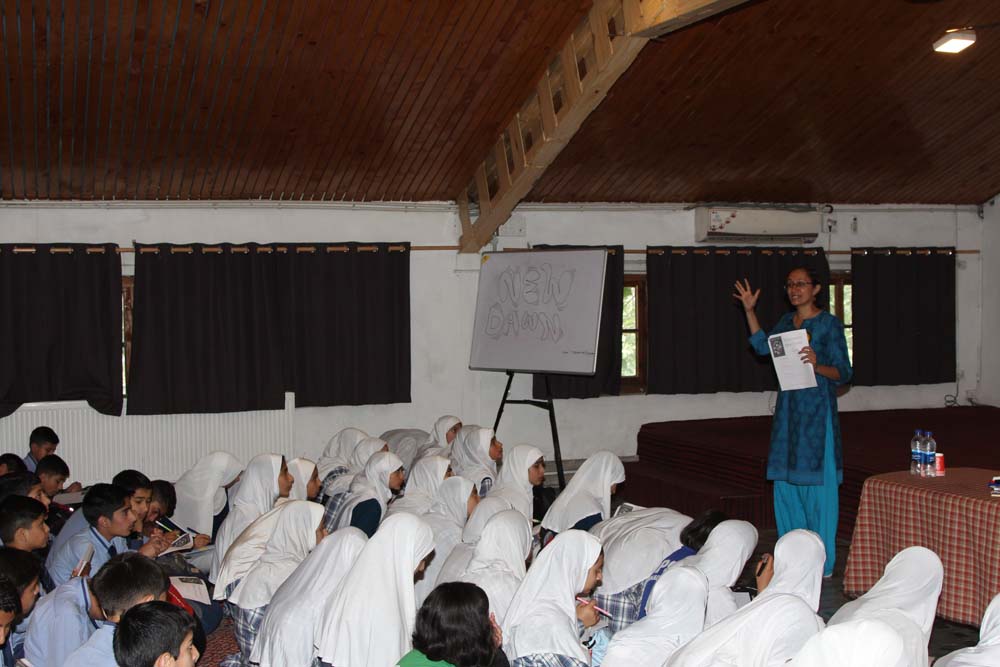
Smoothening the whole process makes the lit fest experience a treat. While you can never make someone buy a book, you can facilitate the process with volunteers who make announcements and guide writers to a desk with a name plate and a pen.
And that makes the whole process come full circle. You write a book, get it published, people find out about it through the event, and then finally, you write a little note and hand the book over to a reader, the one to whom the story finally belongs.
Bookaroo, thank you!
Read, Write, Race
May 14, 2023
Over two years ago, we read Hungry to Read by Arti Sonthalia at my book club. The children thoroughly enjoyed the story, and the book discussion was completely different from what I expected. I thought we would talk about stereotypes and about how judging reading speed isn’t ideal … but none of that happened. Instead, the children talked of how much they loved the book.
For me, Read, Write, Race was a much more enjoyable read, but I can’t help wondering how this one will go with the book club!
Very recently, I realised that even older children are not familiar with dyslexia. This surprised me, as several schools I’ve worked with have encountered dyslexia and spoken to children about it. While I have no idea how old I was when I first encountered the word, I look forward to talking to the children about learning disabilities. With Read, Write, Race, we’ll follow Raghav’s journey, as he struggles to read and write like a neurotypical child.
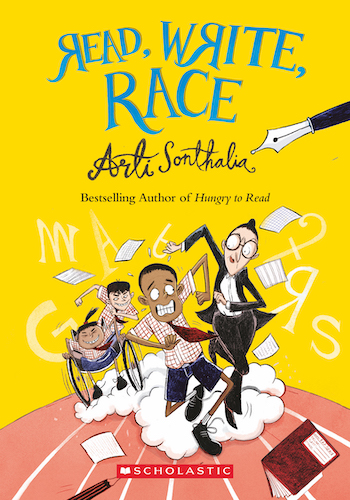
Dyslexia
The protagonist of Read, Write Race, Raghav, is dyslexic. What does this mean? I’ll share a few dyslexia worksheets to help the children understand the term better, following which we’ll read a reverse poem about dyslexia and do a few unscrambling puzzles.
Book Discussion
How inclusive is your school? Do you have children who are hearing impaired, visually impaired, or wheelchair bound? What do you think would change if your class was inclusive?
This is a subject close to my heart. I think it is worth discussing the idea that accommodating people with special needs is very different from including them!
Spell Bee
Spelling bees are fun, and they’re even more fun when you try to spell in a team, or backwards! Looking forward to quite a bit of hilarity as we spell words from the book and challenge one another!
Join my book club!
